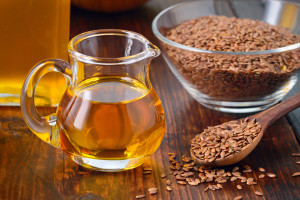Written by Jessica Patella, ND. Two months of daily supplementation with flaxseed or Vitex agnus, significantly lowered cyclical breast pain in both intensity and duration in the 106 participating women compared to those in the control group.
An estimated 60-70% of women suffer from moderate to severe breast pain and 10-20% suffer from severe breast pain in their lifetime 1. The most common form of breast pain is cyclical breast pain associated with the menstrual cycle 2. Recent research has found that supplementing with flaxseed or Vitex agnus can significantly improve breast pain in women 3.
Breast pain in women can interfere with 48% of sexual activity, 37% of physical activity 12% of social activities and 8% of school activities 3. The main cause is due to excess estrogen, deficient progesterone and psychological stress 4. The main chemical treatments, such as tamoxifen, have serious side effects and therefore many women look for natural alternatives 1,4.
The research included 159 women (18-45 years of age) with breast pain who were randomly assigned to one of 3 groups (n=53 in each):
- Group 1: 25g Flaxseed powder and a placebo pill
- Group 2: One Vitex agnus tablet (3.2-4.8 mg dried extract) and a placebo powder
- Group 3: Placebo powder and placebo pill. All supplements were taken daily for 2 months. Flaxseed powder was used because it is a phytoestrogen and blocks estrogen receptors and has been shown to decrease symptoms of Premenstrual Syndrome (PMS) 1,5. Vitex agus was chosen because it is traditionally used for women with reproductive disorders in Asia 1,6. Pain was then measured daily by each participant (Cardiff pain scale) 1.
Average breast pain intensity and length were significantly lower in both the flaxseed and vitex groups than in the control group 1:
| 1st Month after Intervention | 2nd Month after Intervention | Number of Participants Taking Over-the-Counter Pain Killers | |
|---|---|---|---|
| Flaxseed Group | 67.9% showed significant improvement* | 57.7% showed significant improvement* | 4 – in the first month 3 – in the second month |
| Vitex Agnus Group | 64.2 % showed significant improvement* | 52.8% showed significant improvement* | 3 – in the first month 0 – in the second month |
| Control Group | 18.9% showed significant improvement | 13.2% showed significant improvement | 9 – in the first month 14 – in the second month |
*(P<0.001) for statistically significant data
In conclusion, Flaxseed and Vitex agnus were effective at relieving cyclical breast pain. Future studies need to look at the long-term effects since the results did seem to change the second month, as well as determine the long-term effects after discontinuation of the supplements.
Source: Mirghafourvand M, et al. Effects of Vitex agnus and Flaxseed on cyclic mastalgia: A randomized controlled trial. Comp There Med 24 (2016) 90-95.
© 2015 Elsevier Ltd. All rights reserved.
Posted December 6, 2016.
References:
- Ader DN, South-Paul J, Adera T, Deuster PA. Cyclical mastalgia: prevalence and associated health and behavioral factors. Journal of psychosomatic obstetrics and gynaecology. 2001;22(2):71-76.
- Berek J. Berek and Novak’s Gynecology. 15 ed: Lippincott Williams and Wilkins; 2001.
- Mirghafourvand M, Mohammad-Alizadeh-Charandabi S, Ahmadpour P, Javadzadeh Y. Effects of Vitex agnus and Flaxseed on cyclic mastalgia: A randomized controlled trial. Complementary therapies in medicine. 2016;24:90-95.
- Kataria K, Dhar A, Srivastava A, Kumar S, Goyal A. A systematic review of current understanding and management of mastalgia. The Indian journal of surgery. 2014;76(3):217-222.
- Wuttke W, Jarry H, Christoffel V, Spengler B, Seidlova-Wuttke D. Chaste tree (Vitex agnus-castus)–pharmacology and clinical indications. Phytomedicine. 2003;10(4):348-357.
- Albertazzi P, Purdie D. The nature and utility of the phytoestrogens: a review of the evidence. Maturitas. 2002;42(3):173-185.


